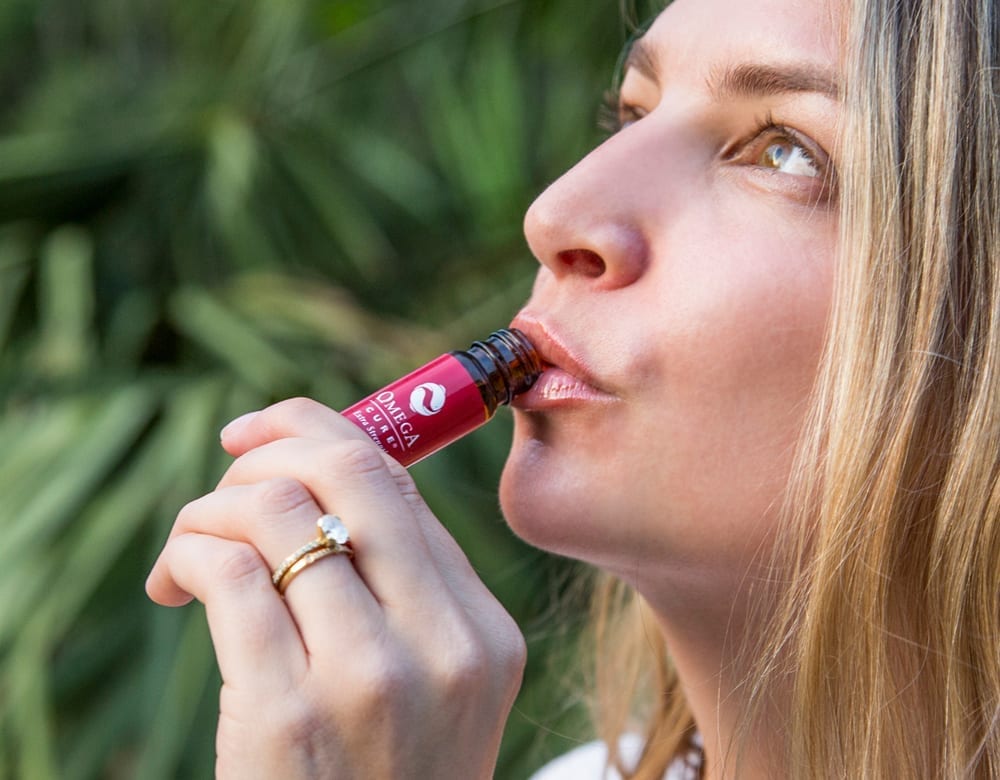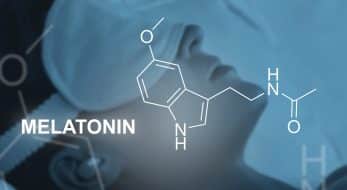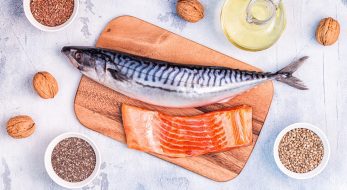Want to Improve Sperm Health? Let’s Talk About Diet
The sperm count in Western men has dropped by 50% since the 1970s, according to a recent report. This is a scary statistic, especially if you are in my boat and hoping to have grandchildren someday.
What exactly is driving this decline in fertility is a hotly debated topic, and likely a number of milieu and lifestyle factors play a part. But there is one key dietary factor that has gone largely unreported in the latest coverage: The role of omega-3 fatty acids in promoting sperm health.
How Do Omega-3s Impact Sperm Health?
Before we get into the details, let’s first define what is meant by poor sperm quality. Low sperm count is defined as anything lower than 15 million per milliliter of semen. No sperm at all is called ‘azoospermia’.
It’s not only the number, but also the morphology of these little swimmers, that’s important. If the head is malformed or if the tail is defective in some way, this will affect the sperm’s ability to reach its goal and to penetrate the ovum or egg. Furthermore, sperm cannot just wiggle in place. They have to be interested in getting somewhere.
Interestingly enough, sperm contains a significant amount of omega-3 fatty acids, just like the brain and the eye. These fatty acids influence the morphology of the sperm. In particular, DHA is necessary for binding the building blocks of the acrosome at the tip of the sperm cell together. This is crucial, since the acrosome contains the enzymes that allows the sperm to break down the walls of the ovum.
DHA also influences the sperm’s physical properties, giving it the fluidity to move well.
DHA is so important that when animals are deprived of DHA, they become infertile. And in human studies, DHA deficiency is a typical indicator of subfertile or infertile men.
DHA represents only one member of the omega-3 fatty acid family.
Getting a Regular Omega-3 Intake
The good news is that sperm quality isn’t necessarily fixed and unchangeable. Animal studies indicate that when you reintroduce enough DHA into the diet, fertility is restored.
There is also indication that omega-3 supplementation may be able to help humans too. However, researchers state that the omega-3 supplements need enough time and to be administered at an effective dose in order to work. This makes sense since the sperm metabolises the DHA and other omega-3s faster than most cells.
The main takeaway for men here is: A little shot of omega-3 now and then isn’t enough to make a difference. You need a regular intake to whip these little swimmers into tip-top shape.
Eat Fewer Omega-6-Rich Foods
If you’re hoping to get your sweetheart pregnant, it’s not just a matter of upping your omega-3 intake though. You also need to consider the fatty acid and fat makeup of the rest of your diet.
Consider this study, examining the hormone levels, testicular volume and lifestyle parameters of over 200 healthy, young Spanish men. The researchers found that the men with the highest intake of omega-6s had lower testicular volumes, whereas the men with higher levels of omega-3s had higher testicular volumes. Why does this matter? Men with larger testicles typically have higher sperm counts and improved sperm parameters. So yes, in this case, size does matter.
The same study also demonstrated that the men with increased levels of omega-6s in their blood had higher levels of luteinizing hormone, a characteristic of primary Leydig cell failure. This factor, coupled with the fact that the men also had lower testicular volumes, suggests omega-6s could negatively contribute to testicular function, according to the researchers.
The Relationship Between Omega-6s and Omega-3s
These opposite effects of omega-6 versus omega-3 intake on male fertility make a lot of sense when you consider the relationship between these fatty acid families.
Omega-3 and omega-6 rival in the cell for the same enzymes. When you get too many of the omega-6 fatty acids in your diet, they end up outperforming the omega-3s. The problem is people’s consumption of omega-6s has skyrocketed over the last decades, thanks to the addition of soybean oil (and other omega-6-rich vegetable oils) to almost all of our processed foods.
Researchers believe that this increased intake of omega-6 at the expense of omega-3 fatty acids can help explain the decrease in male fertility.
Having a relatively even intake of omega-3s to omega-6s is considered key to good health. Unfortunately, most Americans consume far too many omega-6s, thanks to processed foods.
Nix the Trans Fats
Besides reducing omega-6s, you also need to need to be wary of trans fats that you commonly find in fast foods, snack foods, and baked goods.
Trans fats are terrible for sperm. Diets rich in trans fats are associated with low semen quality, low sperm count, and low levels of testosterone concentrations. In fact, one 2014 study found that men with the highest intake of trans fats had a nearly 40% drop in total sperm count compared to the men with the lowest intake of trans fats.
In plain simple English, stuffing your mouth with potato chips, french fries and donuts may have dire consequences for your baby-making abilities. Time to clean up the diet, gentlemen!
Other Sperm-Killers to Note
Besides diet, there are other factors that can help us understand the drop in male fertility.
Specific chemicals, for instance, should be on everyone’s watch list. Researchers note that substances like herbicides, fungicides, insecticides, fumigants, and rodenticides, and solvents (found in paints, varnish, lacquers, thinners, degreasers, and inks) may be a cause.
Also, radiant heat is well-known sperm-killer. Take note, young men that sit with hot laptops positioned directly over the family jewels…
Finally, radiation or X-ray exposure can impact sperm production, and it may take several years for sperm production to revert to normal. Explosive or other miscellaneous agents like heavy metals can also cause male infertility.
…………………………..
If you’re reading this and feeling like your shot at getting someone pregnant is worse than the odds of you running a two-minute mile, don’t despair.
The big takeaway is that what you do — and what you put in your mouth — makes a difference. And sometimes, improving your diet and lifestyle doesn’t have to be challenging. You can easily boost your omega-3 intake by taking Omega Cure®, a fresh, full-spectrum cod liver oil rich in DHA and the rest of omega-3 fatty acid family.
An Effective Omega-3 Dose, Made Simple
Experience the Omega3 Innovations difference for yourself with the most effective fish oil supplement on the market.
Buy Now
References:
Salam, Maya. Sperm Count in Western Men Has Dropped Over 50 Percent Since 1973, Paper Finds. The New York Times. August 16, 2017.
The Mayo Clinic Staff. Low Sperm Count: Definition. Mayo Clinic. July 15, 2015.
University of Illinois College of Agricultural, Consumer and Environmental Sciences. Dietary DHA Linked to Male Fertility. ScienceDaily. January 18, 2012.
Esmaeili, V., Shahverdi, A. H., Moghadasian, M. H. and Alizadeh, A. R. Dietary Fatty Acids Affect Semen Quality: A Review. Andrology (2015), 3: 450–461. doi:10.1111/andr.12024
Minguez-Alarcón, L., Chavarro, J.E., Mendiola, J., Roca, M., Tanrikut, C., Vioque, J., Jørgensen, N. and Torres-Cantero, A.M. Fatty Acid Intake in Relation to Reproductive Hormones and Testicular Volume Among Young Healthy Men. Asian Journal of Andrology (2017). Mar-Apr; 19(2):184-190. doi: 10.4103/1008-682X.190323.
Condorelli, R., Calogero, A.E., and La Vignera, S. Relationship between Testicular Volume and Conventional or Nonconventional Sperm Parameters. International Journal of Endocrinology (2013). doi:10.1155/2013/145792
Chavarro, J. E., Mínguez-Alarcón, L., Mendiola, J., Cutillas-Tolín, A., López-Espín, J. J., and Torres-Cantero, A. M. Trans Fatty Acid Intake Is Inversely Related to Total Sperm Count in Young Healthy Men. Human Reproduction (2014). 29(3): 429–440. http://doi.org/10.1093/humrep/det464
Sharma, R., Biedenharn, K. R., Fedor, J. M., and Agarwal, A. Lifestyle Factors and Reproductive Health: Taking Control of Your Fertility. Reproductive Biology and Endocrinology : RB&E (2013): 11, 66. http://doi.org/10.1186/1477-7827-11-66
Recent Posts
-
Dose, Joint Health, Omega-3
Omega-3 & Pain Relief: Finding the Best Strategy
Are you one among the 1 in 5 Americans grappling with chronic pain, as reported by the CDC [1]? If the thought of traditional pain medications and their potential side...3 months ago -
Eye Health, Omega-3
The Startling Link Between Skin Care and Eye Health
Dry eye complaints are on the rise worldwide. Many risk factors – including aging and increased computer use – help explain the increase. But there's another driver few people know...5 months ago -
Heart Health
Does Taking Fish Oil Lower Cholesterol?
Many people believe that incorporating omega-3s into their diet will solve their cholesterol woes. But the truth is much more nuanced; it's not as simple as taking a daily fish...1 year ago -
Immune Health, Sleep
Melatonin & COVID-19: Can This ‘Sleep Hormone’ Help?
It started with a runny nose and a slight cough. But when his 72-year-old wife tested positive for COVID-19, he got concerned. “Is there any research suggesting the supplements we...2 years ago -
Full-Spectrum Fish Oil, Omega-3
Is It Good to Store Fish Oil in the Freezer?
Fish oil is a great source of the omega-3 fatty acids we all need for good health. It’s also highly perishable. Consuming rancid fish oil can have negative health implications....2 years ago -
Omega-3
Our Favorite Omega-3 Fish Oil Benefits
Omega-3 fish oil certainly has a reputation for delivering a plethora of incredible benefits. And it’s true! Omega-3 fatty acids have been studied for a broad range of health conditions....2 years ago








